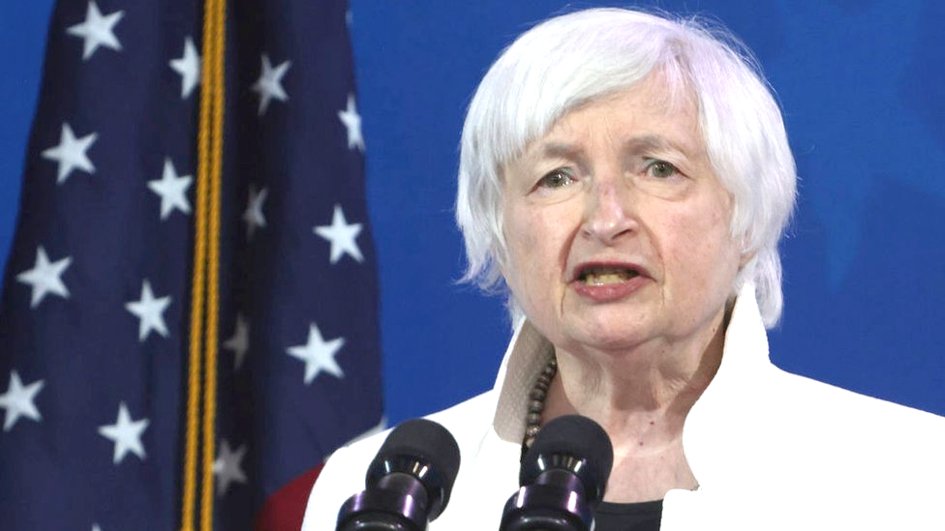NEW DELHI, Nov 11 (PTI): US treasury secretary Janet Yellen, on her first visit to India, touted her ‘friendshoring’ strategy of aligning trade and investment within a group of countries with shared values, in an apparent attempt to cut the role of China.
As the pandemic redraws the trade and economic map of the world, the Biden administration has mooted friendshoring or allyshoring – manufacturing and sourcing components and raw materials within a group of like-minded countries.
Speaking at an event at Microsoft Inc’s facility just outside the national capital, she said US-India are natural allies who can show the rest of the world that democracies can deliver for their citizens despite volatility and war.
“For too long, countries around the world have been overly dependent on risky countries or a single source for critical inputs,” she said. “We are proactively deepening economic integration with trusted trading partners like India.”
The two nations share an interest in strengthening their supply chains in a world where certain governments wield trade as a geopolitical weapon, Yellen said as she introduced the concept of ‘friendshoring’.
While trade can drive growth and bring significant economic benefits to all countries involved, the probability of disruptions should also be accounted for.
“Recent disruptions have contributed to higher prices in both of our countries and sapped economic output,” she said in an oblique reference to energy and commodity prices spiking up after Russia invaded Ukraine.
The US in its new ‘friendshoring’ approach is diversifying away from countries that present geopolitical and security risks to our supply chain, she said.
“Our strategy will also create redundancies in our supply chain to mitigate over-concentration risks. And we are also addressing our reliance on manufacturers whose approaches clash with our human rights values.”
Many western companies that embraced offshoring – cutting costs by shifting manufacturing or certain processes to countries with cheaper labour – have been encouraged by tariffs and pandemic supply chain disruption to bring production back to their home country – a trend known as onshore or reshoring.
But countries like the US cannot make, mine or manufacture everything themselves and so it is now favouring strategic allies when building a supply chain.
Yellen highlighted plans by the US firm First Solar Inc to build a manufacturing facility in Tamil Nadu and Apple Inc’s plans to shift some iPhone manufacturing from China to India.
“To be very clear, friendshoring is not limited to an exclusive club of countries. We seek integration with the large group of countries that we can count on – developing countries and advanced economies alike,” she said. “In fact, part of our ‘friendshoring’ approach involves partnering with developing countries to grow local industries and connect them to the global supply chain.”
She went on to state that the solar manufacturing facility in Tamil Nadu will help diversify supply chains away from China, which currently dominates over 80 per cent of global solar panel production.
“Our investments are also consistent with our values: certain solar panel materials produced in China – like those from the Xinjiang region – are known to be produced with forced labour,” she said.
Stating that there already was progress on ‘friendshoring’, the treasury secretary said new supply chains are developing across regions from Asia to the European Union.
“We are also seeing signs that Western firms are diversifying their supply chains beyond China. Technology companies like Amazon and Google are investing in India and Vietnam,” she said. “The United States will continue to deepen our business and commercial ties with India as we pursue our friendshoring agenda.”
Calling Russia’s war in Ukraine “barbaric”, she said challenges faced today are bringing the United States and India closer together than ever before.
“The trajectory of the global economy will be shaped by the work that India and the United States undertake together,” she said. “The same is true for the prosperity and security of the Indo-Pacific.”
As a leading developing country and the world’s largest economy, the two nations have great opportunity and responsibility to make progress on the world’s most intractable problems.
The US-India “ties are stronger than ever before,” she said.
While the US is home to the largest Indian diaspora outside of Asia and serves as its largest export market, bilateral trade between the two countries reached an all-time high last year and is expected to grow further in the years to come.
“In the Indo-Pacific region, our shared objective is to advance prosperity and maintain peace and security. India and the United States remain committed to upholding the rules-based international order,” she said. “We are working with our allies and partners to tackle global challenges through the Quad and the Indo-Pacific Economic Framework.”
On India assuming the G20 presidency, Yellen said a successful Indian presidency is indispensable to global economic recovery and sustained progress on deepest problems.
The G20, she said, must do better to provide debt relief where necessary.
India’s G20 year is a chance to accelerate global coordination on debt restructuring, she said, adding two years back a Common Framework established in G20 to bring all the major bilateral creditors together to coordinate timely and orderly debt relief for low-income countries could not deliver largely because of lack of cooperation from China.
“As a consequence, debtor countries in need are hesitant to request Common Framework treatment. This needs to change. All major bilateral creditors, including China, must cooperate constructively to deliver on their G20 commitment to provide meaningful debt relief. We must also improve the speed and predictability of the Common Framework itself,” she said.
On climate action, Yellen said the US and India – the world’s second and third-largest emitters, have a shared interest and responsibility to reduce greenhouse gas emissions. “A global challenge like climate cannot be solved by any one country. It requires all of us to work together.”
“We live in difficult and complicated times. We face urgent problems that require concerted and collective action,” she said. “The work of our two countries has never been more vital.”











